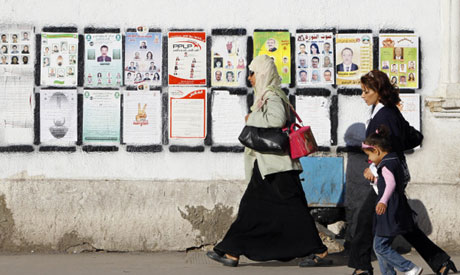
Tunisians walk past elections posters in Tunis Wednesday, Wednesday, (AP).
Zine El Abidine Ben Ali may have fled to Saudi Arabia in January, but many of the people who helped him rule Tunisia with an iron fist for 23 years still hover in the shadows.
Many of them even hope to occupy a place in post-revolution Tunisia. Nearly half of the more than 100 political parties registered for historic elections Sunday are backed or created by former members of Ben Ali's now dissolved Rally for Constitutional Democracy (RCD).
A commission charged with political reforms following Ben Ali's ouster has banned all former RCD office bearers from contesting post-revolution elections, a decision confirmed by the independent electoral commission.
"The RCDists believe that the country cannot function without their participation in the next government," said university professor and writer Hmida Ennaifer.
"They believe they are indispensable and imagine that nobody can equal their experience or their territorial reach."
Though the highest heads in government have rolled, RCD members continue to run the state bureaucracy. The party used to have cells in every public entity and committees in all residential zones.
Many among the former RCD members prefer to keep their new political aspiration in the shadows, but some have taken front stage, even stating their intention of participating in a future government.
Kalmel Morjane, a 63-year-old former minister in the Ben Ali cabinet and an ex-UN official, is one of the best known. He has started a new party, Al-Moubadara (the Initiative) which was legalised in April, but cannot stand as a candidate because of the ban.
Created in 1998, the RCD took over from the Socialist Destourian Party of the country's independence leader Habib Bourguiba, and claimed a membership of two million from a 10-million population at its height.
Omnipresent, it controlled all the organs of state and infiltrated even private associations and opposition parties, but started losing ground in recent years as all efforts were focused on boosting the personal enterprises of Ben Ali and his clan.
Despite the ban on the RCD, many Tunisians suspect its members of "having left by the front door only to reenter through the window," said Ettakol opposition party leader Mustapha Ben Jaafar.
One jurist, who asked to remain anonymous, said the transitional government under Prime Minister Beji Caid Essebsi, a former RCD member, "has done everything it can to block judicial procedures" against Ben Ali and his backers.
"Their financial interests have not been touched in spite of the judicial proceedings" underway.
Non-governmental bodies Transparency International and Sherpa have estimated the assets of Ben Ali and his entourage in former colonial master France to total about $5 billion (3.6 billion euros) -- including private hotels, apartments in Paris and a villa or two on France's Cote d'Azur.
Switzerland has this year frozen more than 60 million Swiss francs (48 million euros, $66 million) in assets held by Ben Ali and his entourage, while in Canada the family's assets are estimated to total as much as $20 million.
Ben Ali, so far sentenced in his absence to more than 66 years in prison for a range of economic crimes, remains in exile in Jeddah, Saudi Arabia, with his hairdresser-turned first lady, Leila Trabelsi.
Tunisia has sought their extradition.
Short link: